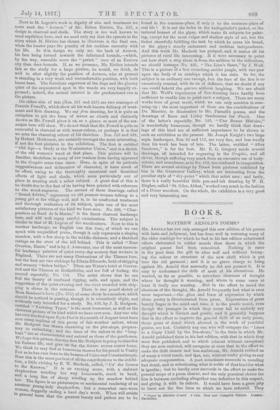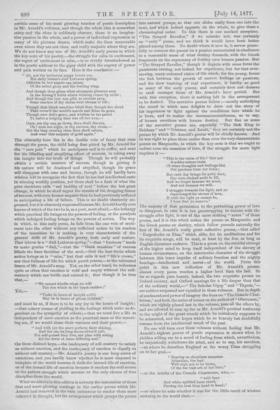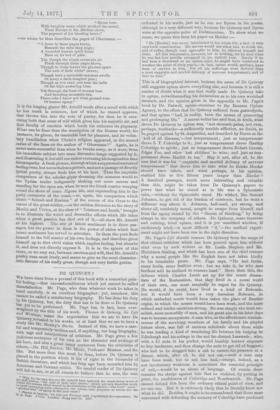BOOKS.
MATTHEW ARNOLD'S POEMS.*
Mn. AnNoLn has not only arranged this new edition of his poems with taste and judgment, but has done well in restoring many of the older readings for which he had in his last edition substituted others elaborated in colder moods than those in which the original poems had been conceived. Nothing is rarer in the poet than the gift to alter well and without betray- ing the colour or structure of the new cloth which is put into the old garment ; and it is no grave charge to bring against Mr. Arnold that assuredly he did not possess it. It is easy to understand the drift of most of his alterations. He wanted, as far as possible, to introduce clearness of thought where he thought it wanting, and where in some cases at least it really was wanting. But in the effort to mend the clearness of the thought, Mr. Arnold frequently lost what is even more important,—the glow and force of expression by which alone poetry is discriminated from prose. Expressions of great beauty linger iu the mind and raise it to the poetic mood, even though the passages in which they occur fail to embody any thought which is distinct and poetic, and it generally happens. that in the effort to improve the general drift of an early poem,. those gems of detail which abound in the work of youthful genius, are lost. Certainly any one who will compare the "Lines to a Gipsy Child by the Sea-shore," in the form in which Mr. Arnold published them in his last edition, with that in which they were first published, and to which (almost without exception). they are now restored, will recognise at once that in the effort to make the drift clearer and less ambitious, Mr. Arnold robbed us of many a vivid touch, and tba,t, too, without really giving us any adequate compensation. A poet sometimes succeeds in mending bad detail, and in substituting what is noble of that kind for what is ignoble ; but he hardly over succeeds in the effort to make the general scope of a poem clearer, and the only practical choice for him is between excluding altogether pne defective in this respect, and giving it with its defects. It would have been a great pity to leave out the fine lines to which we have referred. They * Poems by Matthew Arnold. 2 role. New end Complete Edition. Leaden
contain some of the most glowing touches of poetic description in Mr. Arnold's volumes, and though the whole idea is somewhat misty and the close is sublimely obscure, there is an imagina- tive passion in the whole, and a power of individual expression in many of the pictures drawn, which make the lines memorable
even where they are not clear, and really majestic where they are. We do not know any one of Mr. Arnold's early poems in which the key-note of his poetry,—the struggle for calm in excitement, the regret of excitement in calm,—is so vividly foreshadowed as in the poetic address to the gipsy child with the augury of power and pain written on its face. Here is the conclusion :— " Ah, not the nectarous poppy lovers use. Not daily labour's dull Lothrean spring, Oblivion in lost angels can infuse
Of the soiled glory and the trailing wing.
And though thou glean what strenuous gleaners may
In the throng'd fields where winning comes by strife ; And though the just Bun gild, as mortals pray,
Some reaches of thy storm-vext stream of life; Though that blank sunshine blind thee, though the cloud That sever'd the world's march and thine be gone, Though ease dulls grace, and wisdom ho too proud
To halve a lodging that was all her own,—
Once, ore thy sun go down, thou shalt discern,
Oh I once ere night, in thy success, thy chain,— Era the long evening close thou shalt return,
And wear this majesty of grief again."
The obscurity here lies in the double vein of fancy that runs through the poem, the child being first pitied by Mr. Arnold for the "sure pain" which he anticipates and is to suffer, and next for the blinding and stupifying effect of success, in taking away bis insight into the truth of things. Though he will probably
obtain a certain measure of success, though in getting it his nature will be deadened and stupified, though its grace will disappear with ease and luxury, though he will hardly have
wisdom left to recognise the fact that be has lost intellectual caste in winning worldly position, yet there shall be a flash of what the poet elsewhere calls "sad lucidity of soul" before the last great change, in which he shall regret the results of the drugging fumes of success, with even keener anguish than he had previously suffered in anticipating a life of failure. This is no doubt obscurely ex- pressed, but it is obscurely expressed because Mr. Arnold hardly ever knows of which of the two he is, as a poet, most afraid,—the lethargy which practical life brings on the powers of feeling, or the paralysis which indulged feeling brings on the powers of action. The way in which, in this early poem, he falls from the one vein of senti- ment into the other without any sufficient notice to his readers
of the transition he is making, is very characteristic of the
• general drift of Mr. Arnold's poetry, both early and mature, That labour is a "dull Lethrean spring,"—that " business " tends to make genius "dull,"—that the "blank sunshine" of success blinds the finer faculties of the soul,—that the beat fruits which nation brings us is "calm," but that calm is not "life's crown," tor that fullness of life for which youth yearns,—is the reiterated lesson of Mr. Arnold's song. Yet, on the other hand, he reiterates quite as often that emotion is void and empty without the self-
(mastery which can bridle and control it ; that though it be true that,—
"We cannot kindle when we will
The lire which in the heart resides ;"
"Tasks in hours of insight May be in hours of gloom f ulfilled,"
and must be so, if there is to be any joy in the hours of insight ; —that misery comes of yielding to the feelings which make us de- pendent on the sympathy of others ;—that we must live a life as independent of mere emotion as the punctual stars or the unrest- cing sea, if we would share their vastness and their power,—
" And with joy the stars perform their shining, And the sea its long moon-silver'd roll;
For self-poised they live, nor pine with noting All the fever of some differing soul."
On these distinct keys,—the inadequacy of self-mastery to satisfy ve without emotion, and the inadequacy of emotion to dignify us without self.mastery,—Mr. Arnold's poetry is one long series of variations, and you hardly know svbether he is most disposed to 'complain of the world because it dulls the inward life of emotion, or of the inward life of emotion because it renders the soul averse to the patient struggle which secures us the only chance of true 'discipline from the world.
What we admire in this edition is notonly the restoration of those dint and more glowing readings in the earlier poems which Mr.
Arnold had removed in the vain endeavour to render them more 'coherent in thought, but the arrangement which groups the poems Yet,— into natural groups, so that one slides easily from one into the next, and which indeed appears, on the whole, to give them a chronological order. To this there is one marked exception. "The Strayed Reveller," if we mistake not, was certainly an " early " poem, and we think it would have been better placed among them. No doubt where it now is, it serves graoe- fully to connect the poems on a passion surmounted in obedience to a reasonable sense of what destiny demands, with the Greek fragments on the supremacy of destiny over human passion. But "The Strayed Reveller," though it depicts with some force the passionate craving, not indeed for experience, but for that ever- moving, many-coloured vision of life which, for the young, forms the link between the growth of mature feelings or passions, and the slow teaching of real experience, is hardly so good as many of the early poems, and certainly does not deserve to rank amongst those of Mr. Arnold's later period. But with this exception, there is nothing left in the arrangement to be desired. The narrative poems follow ;—mostly embodying the mood in which man delights to draw out the story of his impotence to fight against the conditions into which he is born, and to realise the incommensurableness, so to say, of human emotions with human destiny. But fine as some of the narrative poems are, especially "The Sick King in Bokhara " and "Tristram and Iseult," they are certainly not the
poems by which Mr. Arnold's genius will be chiefly known. And he was right to place them earlier than even the very characteristic poems on Marguerite, in which the key-note is that we ought to endure even the cessation of love, if the struggle for more light requires it :— " This is the curse of life I that not A nobler calmer train Of wiser thoughts and feedings blot Our passions from our brain;
But oaoh day brings its petty dust, Our soon-choked souls to fill, And we forget because we must, And not because we will.
I struggle towards tho light, and ye Once-longed-for storms of love, If with the light ye cannot be, I bear that yo remove."
The majesty of that permission to the perturbing power of love to disappear, in case it is too preoccupying to coexist with the struggle after light, is one of the most striking " notes " of these poems, and it is this which makes the poems on Marguerite, and the Greek poems on destiny, which follow precede naturally the
first of Mr. Arnold's really great reflective poems,—that called " Empedocles on Etna," which, alike for its meditations and for its exquisite songs, will be read, at least by the few, as long as
English literature endures. This is a poem on the suicidal attempt of the higher mind to keep itself independent of the slavery of human circumstance, on the internecine character of the struggle between this inner impulse of solitary freedom and the mighty bondage—intellectual and moral—of the world. From this point in this new collection of Mr. Arnold's poems, almost every poem reaches a higher level than the last. So far as regards pure beauty, indeed, the two exquisite poems on
Oxford scenery, and Oxford cravings for a life deeper than that of the ordinary world,—" The Scholar Gipsy" and " Thyrsis,"— are neither surpassed nor equalled in these volumes. But in depth of sentiment and power of imagery the lines on "The Grande Char- treuse," and both the series of verses on the author of " Obermann," which are rightly placed last in the volume, pass all the others by, and are allowed to sum up for us Mr. Arnold's poetical testimony
to the might of the great creeds which he mistakenly supposes to be exhausted, and the hopes which he so bravely but doubtfully rescues from the intellectual wreck of the past.
No one will turn over these volumes without feeling that Mr. Arnold's highest power of poetic expression is shown when he yields a willing ear to a mood of feeling from which, nevertheless, he majestically withdraws his mind, and so to say, his sanction, — as where he describes England as the weary Titan struggling on to her goal,—
" Bearing on shoulders immense Atlantiian, the load
Well-nigh not to be borne, Of the too vast orb of her fate ;"
— or the =ribs of the Grande Chartreuse, who,— " with bare
And white uplifted faces stand, Passing the host from hand to hand ;"
—or where he asks whether it was for the little result of wisdom accruing to the world that,— "Byron bore With haughty scorn which mocked the smart, From Europe to the 2Etelian shore, The pageant of his bleeding heart ;"
—or where he thus describes the pages of Obermann :—
"A fever in these pages burns, Beneath the calm they feign ; A wounded human spirit turns Here on its bed of pain.
Yes, though the virgin mountain air Frouh through those pages blows, Though to those leaves the glaciers spare The soul of their white* snows; Though here a mountain-murmur swells Of many a dark-boughed pine; Though as you read, you hear the bells Of the high-pasturing kino.
Yet through the hum of torrent lone And brooding mountain-boo, There sobs I know not what ground-tone Of human agony."
It is the longing glance Mr. Arnold sends after a mood with which he has much in common, but of which he cannot approve, that throws him into the vein of poetry, for then he is exer- cising both that sense of will which gives him his majestic air, and that faculty of emotion which lends his reticence its piquancy. What can be finer than the description of the Roman world, for instance, its gloom, its insatiable lust for pleasure, and its volun- tary humiliation when Christ's religion appeared, in the second series of the lines on the author of " Obermann ?" Again, he is never more successful than when he breaks away, as it were, from his immediate subject into some discursive image suggested by it, and illustrating it, but still one rather exercising his imagination than his sympathy. A fresh picture, through which a suppressed current of feeling runs, but nevertheless a picture, and not a passage of directly lyrical poetry, always finds him at his best. Thus the exquisite comparison of the scholar-gipsy shunning the common world to the Tyrian trader indignantly shaking out more canvas and standing for the open sea, when he sees the Greek coaster creeping round the shore of some lEgean isle, and superseding him in the petty commerce of the coast,—or, again, the comparison which closes " Sohrab and Rustum " of the course of the Oxus to the career of the great soldier,—or the sudden diversion to the Story of Merlin and Vivien, at the close of "Tristram and Iseult," brought in to illustrate the weird and dreamlike effects which life takes when a great passion has died out of it,—all show Mr. Arnold at his highest. The stir of latent sentiment is in these pas- sages, but the power in them is the power of vision which that latent sentiment has served to stimulate. In them the poet finds himself to the full master of his own feelings, and therefore gives himself up to that vivid vision which implies feeling, but absorbs it, and does not directly express it. It is in the sphere of this truce, as we may say, between emotion and will, that Mr. Arnold's poetry runs most freely, and seems to give us the most character- istic flavour of his really great, though not very fertile genius.




































 Previous page
Previous page